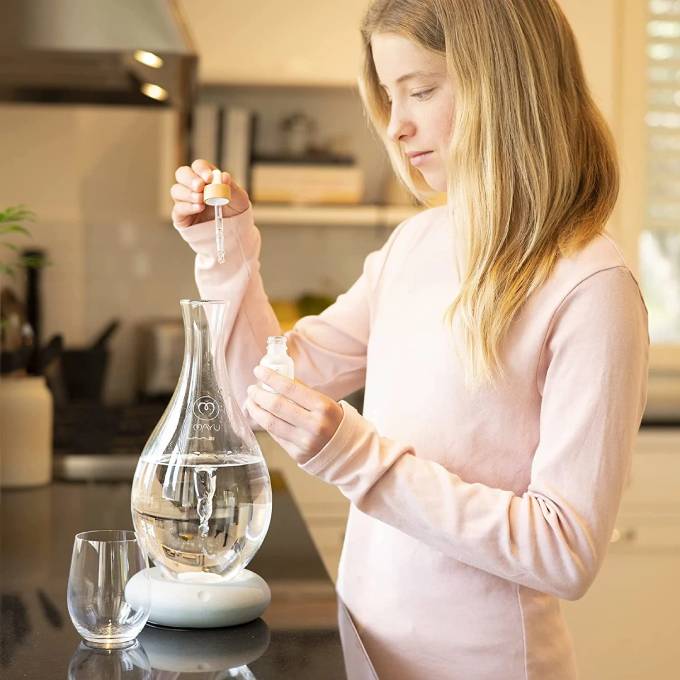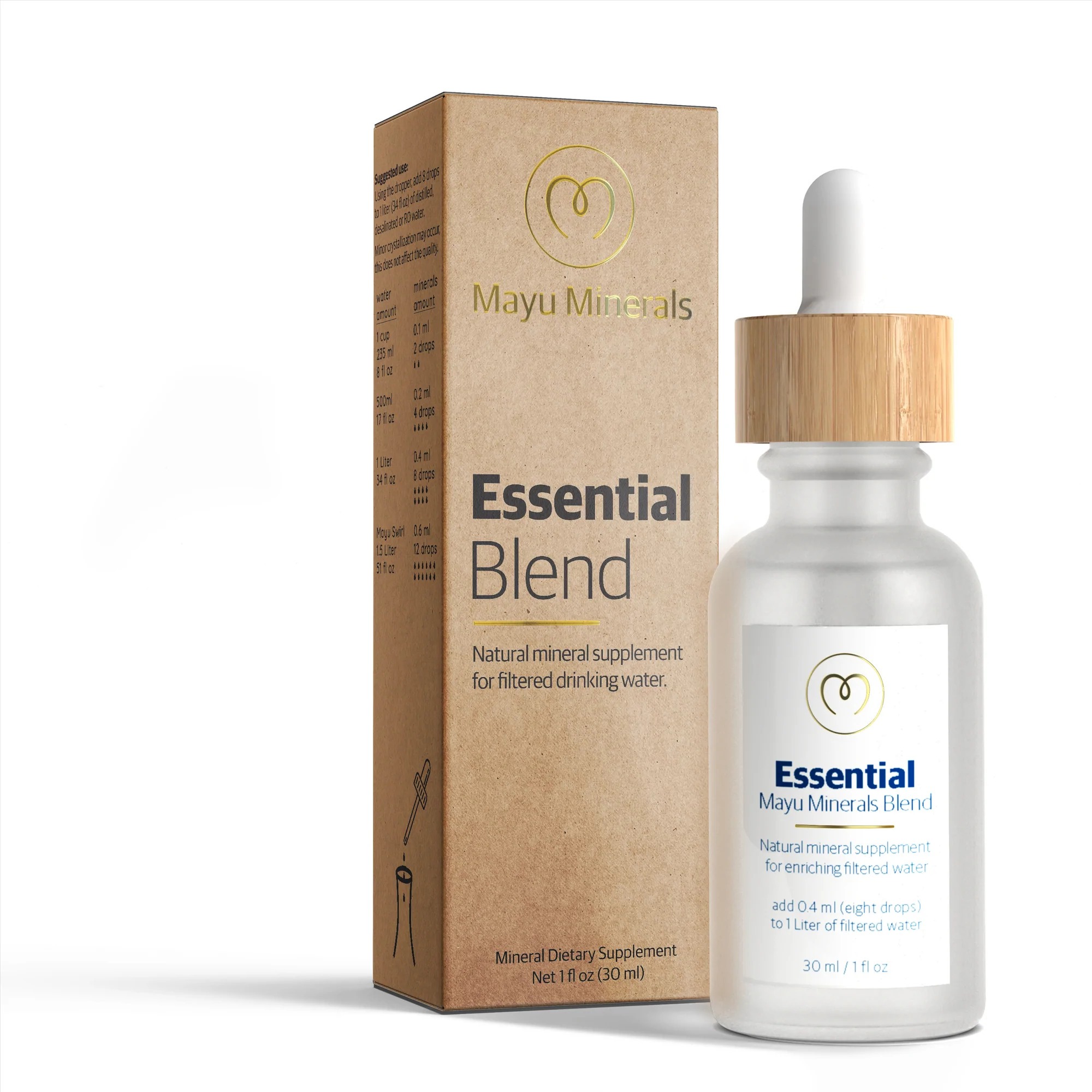10 Best Mineral Drops For Reverse Osmosis Water in 2026
Understand why remineralization is essential explore the top liquid mineral drops that restore key electrolytes like calcium, magnesium, and potassium lost during filtration.
Updated May 21, 2025

Reverse osmosis (RO) filtration produces very pure water, but it also strips out beneficial minerals (like calcium, magnesium, potassium, and trace elements) that are important for health.
Drinking only demineralized water can leave water “flat” tasting and may contribute to mineral deficiencies over time. Studies show RO removes ~92–99% of calcium and magnesium, increasing the risk of bone loss and fatigue [1].
Adding high-quality trace mineral drops back into RO water restores these nutrients, improving taste, hydration, and health benefits. We’ve compiled the top RO remineralization drops to help you replenish essential electrolytes and enjoy your water again.
» Discover how mineral drops replenish vital nutrients in RO water
Our Picks for the 10 Best Water Remineralization Drops
How Do RO Water Remineralization Drops Work?
Adding drops to your RO water helps restore essential minerals, such as calcium, magnesium, sodium, potassium, and trace elements like zinc and selenium, which are all important for maintaining healthy bones and teeth, regulating blood pressure, supporting nerve function, and more [2].
These drops not only improve the taste and alkalinity of the water but also provide crucial electrolytes that aid in hydration and overall bodily functions. Not having enough minerals can cause issues like [3]:
- Fatigue
- Muscle cramps
- Imbalance of fluids
Did you know?
Mineral drops can enhance the bioavailability of nutrients and promote better absorption in the body. The drops replenish what's lost to give water nutritional value again, giving them a positive effect on energy levels and recovery.
» Discover key benefits of reverse osmosis water for your health
Why Use Mineral Drops For Reverse Osmosis Water?
The Problem with RO Water
- Mineral Depletion: RO membranes filter out contaminants and nearly all dissolved minerals. The result is water that’s pure but lacks calcium, magnesium, and other electrolytes.
- Health Impacts: Prolonged drinking of low-mineral water can “leach” minerals from the body and may contribute to mineral deficiencies (e.g. weaker bones, muscle cramps, fatigue).
- Flat Taste: Without minerals, RO water often tastes flat or bland. Trace minerals give water a slightly sweeter, rounder flavor, encouraging you to drink more.
» Find out why RO water smells like fish
Key Minerals Lost in RO Water and Why They Matter
- Calcium: Essential for bone and teeth health, nerve transmission, and muscle contraction [4].
- Magnesium: Cofactor in 300+ biochemical reactions; supports bone strength, muscle/nerve function, and energy production [5].
- Sodium and Potassium: Regulate hydration, blood pressure, and nerve signaling. They are critical electrolytes for fluid balance and muscle function [6].
- Trace Elements (e.g. Zinc, Selenium, Iodine): Support immune function, thyroid health, and antioxidant defenses. Many trace minerals contribute to overall metabolism and thyroid function [7].
» Learn what you need to look for when buying a RO system
Benefits of Remineralizing RO Water
- Improved Taste & Hydration: Adding minerals removes flat taste, making water more palatable. Electrolyte-rich water quenches thirst better than pure H₂O. In other words, you’ll naturally drink more water.
- Nutritional Support: Remineralized water supplies bioavailable calcium and magnesium, supporting bone health and muscle function. Drops may also boost nutrient absorption and energy metabolism
- Balanced pH: Some remineralizing drops add alkaline minerals that can mildly raise RO water’s pH, making it less acidic and gentler on your digestive system.
- Prevent Imbalances: Restoring electrolytes helps prevent symptoms of mineral deficiency (fatigue, cramps, fluid imbalance) that pure water alone might contribute to.
» Check out the best countertop RO systems that can also remineralize
Top Mineral Additives for RO Water: Quick Comparison
| Product | Key Minerals / Ingredients | Volume & Servings | Notable Features |
|---|---|---|---|
| 1. MAYU Minerals Essential Drops | Ionic Calcium, Magnesium, and 72 other trace minerals | 1 fl oz (≈60 servings; 8 drops/L) | Ultra-concentrated; completely flavorless; vegan; no sweeteners |
| 2. Trace Minerals ConcenTrace Drops | Magnesium, Potassium, Sodium + 72+ trace minerals | 8 fl oz (large supply) | Sea-sourced electrolyte blend; gluten-free, non-GMO, vegan; gently salty taste |
| 3. Biotrace Concentrated Mineral Drops | Comprehensive spectrum (Ca, Mg, K, etc.) | 8.11 fl oz (≈240 mL) | Alkaline formula for pH balance; very high concentration (few drops needed); from natural sources |
| 4. Lyteline LyteTrace Mineral Concentrate | 79 Essential & Trace Minerals (low sodium) | 3.38 fl oz (≈100 mL) | Keto-friendly; vegan; includes electrolytes for energy; easy absorption |
| 5. Peak Performance Trace Minerals Drops | Fulvic Acid base + 72 plant-sourced trace minerals | 8 fl oz (237 mL) | Plant-based minerals with fulvic acid to boost absorption; allergen-free; supports immune health |
| 6. Eidon Ionic Minerals Blend | Magnesium, potassium, calcium, zinc, selenium | 2 fl oz (60 mL) | Silica base for mineral stability; tasteless formula suits the purity of RO water |
| 7. AquaTru Perfect Minerals | Potassium, magnesium, calcium | 2 fl oz (60 mL) | Compatible with AquaTru filters, pH-neutral formula ensures it won't alter the balance of RO water |
| 8. Swanson Alkaline Booster pH Protector Drops | Potassium hydroxide, sodium hydroxide | 1.25 fl oz (37.5 mL) | NSF-certified ingredients; 360 servings so you have a long-lasting supply |
| 9. Alkalife pH Booster Drops | Potassium hydroxide, sodium hydroxide | 1.25 fl oz (37 mL) | 360 servings per bottle; no synthetic additives |
| 10. Alkazone Alkaline Water Drops | Potassium bicarbonate, magnesium lactate, calcium chloride, zinc, selenium | 1.25 fl oz (37 mL) | Raises pH to 9.5+; antioxidant-rich; supports detox and skeletal health |
» Find out if a water softener is better than reverse osmosis for filtration
5 Best Mineral Drops for RO Water
Factors to Consider When Choosing Mineral Drops for RO Water
Discovering the right mineral drops isn't just about flavor; it's about enhancing your hydration with elements that support your well-being.
Consider the following when making your selection:
- Complete Mineral Profile: Look for a product with essential minerals like calcium, magnesium, sodium, and potassium. Ensure it includes trace elements to replenish what's lost during RO filtration.
- Purity and Safety: Prioritize products with high purity standards. Check certifications and avoid those with added sugars, preservatives, or excessive additives.
- Ease of Use: Choose products with a user-friendly format and a precise dispensing mechanism for hassle-free daily use.
- Taste Considerations: Explore different options based on subjective taste preferences. Read reviews to find drops that enhance water taste without compromising essential minerals.
- Budget and Value: Stay within your budget while comparing products based on mineral content, purity, and user reviews. Prioritize hydration health goals over compromising quality.
» Learn how to turn your RO water alkaline and avoid digestive issues
Unlocking the Full Potential of RO Water
Remineralizing your RO water is simple and effective with the right drops. By choosing any of the top picks above, you can restore crucial minerals and electrolytes to your water, improving taste and supporting your health.
Our overall favorite is Mayu Minerals Essential Drops for its comprehensive mineral profile and neutral taste. Pair that with any high-quality RO system for pure, nutrient-rich hydration.
References:
- K. V, R. Mani, V. Venkatesh, S. Kunhikannan, and S. Ganesh V., “The role of low mineral water consumption in reducing the mineral density of bones and teeth: a narrative review,” Cureus, Nov. 2023, doi: 10.7759/cureus.49119. Available: https://pmc.ncbi.nlm.nih.gov/articles/PMC10732328/
- C. Weyh, K. Krüger, P. Peeling, and L. Castell, “The role of minerals in the optimal functioning of the immune system,” Nutrients, vol. 14, no. 3, p. 644, Feb. 2022, doi: 10.3390/nu14030644. Available: https://pmc.ncbi.nlm.nih.gov/articles/PMC8840645/
- S. Radcliffe, “Mineral deficiency,” Healthline, Mar. 15, 2018. Available: https://www.healthline.com/health/mineral-deficiency
- “Office of Dietary Supplements - calcium.” Available: https://ods.od.nih.gov/factsheets/Calcium-Consumer/
- “Office of Dietary Supplements - magnesium.” Available: https://ods.od.nih.gov/factsheets/Magnesium-HealthProfessional/
- I. Shrimanker and S. Bhattarai, “Electrolytes,” StatPearls - NCBI Bookshelf, Jul. 24, 2023. Available: https://www.ncbi.nlm.nih.gov/books/NBK541123/
- Q. Zhou, S. Xue, L. Zhang, and G. Chen, “Trace elements and the thyroid,” Frontiers in Endocrinology, vol. 13, Oct. 2022, doi: 10.3389/fendo.2022.904889. Available: https://pmc.ncbi.nlm.nih.gov/articles/PMC9637662/
Disclaimer: The information published by MAYU Water is not a substitute for the expert knowledge, advice, and recommendations of trained professionals. We strongly recommend consulting with industry experts and primary or scientific sources before making any health, research-related, or other important decisions.
FAQs
Is RO water safe to drink?
Yes, RO water is safe to drink. It’s purified by removing contaminants like bacteria, heavy metals, and chemicals.
Can RO water dehydrate me?
No, RO water will not dehydrate you. It hydrates just like other water.
Can RO water cause constipation?
RO water itself doesn’t cause constipation, but drinking only demineralized water over time may contribute if you’re low on essential minerals like magnesium.
Is RO water free from microplastics?
Yes, RO (reverse osmosis) water is generally free from microplastics. RO membranes filter particles as small as 0.0001 microns, small enough to block most microplastics.
Does RO water have chlorine?
RO systems often include pre-carbon filters that are effective at removing chlorine before the water reaches the RO membrane. Some systems also have a post-carbon filter for further purification.





























































